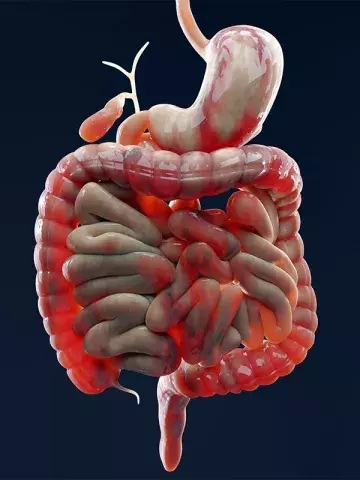Crohn’s disease: trial supporting top-down therapy ‘a game changer’
By Rebecca Jenkins
Research showing the benefits of early combination therapy with infliximab for patients with newly diagnosed Crohn’s disease is a game changer, an Australian expert says.
Professor Paul Pavli of the Australian National University’s School of Medicine and Psychology, Canberra, was commenting on a UK randomised trial of 386 adults where significantly more patients achieved sustained surgery- and corticosteroid-free remission with top-down therapy combining infliximab and an immunomodulator, than with accelerated step-up treatment.
Writing in The Lancet Gastroenterology and Hepatology, researchers said outcomes were unpredictable under the accelerated step-up approach that progressed through a cycle of steroids, then steroids and an immunomodulator, and finally the addition of infliximab if necessary, but it remained the most common treatment strategy globally.
In this study, 79% of participants in the top-down group achieved remission at 48 weeks compared with 15% in the step-up arm, equating to a 64% difference.
The researchers also found there were fewer adverse events or serious adverse events in the top-down group than in the step-up group (adverse events 168 vs 315 and serious adverse events 15 vs 42, respectively).
Of note, nine participants in the step-up treatment arm developed complications requiring abdominal surgery compared with one patient in the top-down group.
‘Top-down treatment should be considered standard care for patients with newly diagnosed active Crohn’s disease,’ the researchers concluded.
Professor Pavli, who is also a Director at Crohn’s and Colitis Australia, said the trial findings were transformative for Crohn’s therapy and provided a strong argument to review the PBS Authority requirements for biological agents.
Although several biological agents have been added to the therapeutic armamentarium since 2007, the entry requirements remained essentially unchanged, he told Medicine Today.
‘The study showed that virtually every outcome was better using the top-down approach, including the need for surgery,’ Professor Pavli said.
‘There is no questioning the improved outcomes and safety of this top-down approach; the only reservation relates to the cost-effectiveness.’
Risks were not greater in the top-down group, Professor Pavli highlighted, in fact, inadequate treatment of active disease seemed to confer the greatest risk to patients.
As part of the study design, participants (mean age 33.6 years; 46% women) were stratified using an experimental blood-based biomarker; however, researchers concluded this had no clinical use for guiding therapy.
Professor Pavli agreed with the researchers that the scale of benefit in the trial weakened the case for developing a prognostic marker for newly diagnosed patients treated with infliximab.
However, he said there were other potential uses for a biomarker, noting 21% of patients did not meet the trial’s primary endpoint and it was unclear how they should best be treated.
‘Currently the choice of a second-line biological agent, and indeed, first-line therapy, is the best guestimate – a biomarker could help in this regard and make it less of a trial-and-error approach,’ he said.
Lancet Gastroenterol Hepatol 2024; doi.org/10.1016/ S2468-1253(24)00034-7.


